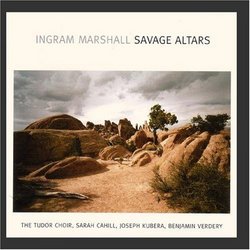"Savage Altars" may be Ingram Marshall's "expressivist" mast
svf | 05/26/2006
(4 out of 5 stars)
"Ingram Marshall's music could be described as minimalist, neo-romantic, totalist, ambient, and even New Age, yet it doesn't neatly fit into any of these categories. (Ingram Marhsall himself apparently prefers the purposefully meaningless term "expressivist" when describing his style.)
Whatever you call it, I've always found Marshall's music to be a hit-or-miss affair: sometimes shamelessly lovely, atmospheric and appealing; other times meandering, gimmicky, and dull.
Everything comes together perfectly, however, in Savage Altars, his 1991 work for chamber choir, electronic tape, and violin and viola obbligato.
Savage Altars alternates rather abruptly between spooky and harrowing sections of rhythmic choral chanting and drop-dead gorgeous interlocking scalar passages that almost seem to float in suspended bliss.
The ancient Roman and Latin texts used as source material -- Annals Book I by Tacitus (a rather grim militaristic affair), the Magnificat hymn, and Reading Rota (a.k.a. "Sumer is i cumen in") -- are freely intermingled and sung in a pure, non-vibrato, almost Medieval choral style.
Its structure is somewhat episodic: one section begins and ends, followed by the next section, and so forth, which creates the feel of an unfolding procession or ritual (and does so more effectively in its concise 20 minutes than John Taverner's bloated The Veil Of The Temple does in several sprawling hours.) Some parts sound a little like Perotin, Arvo Part, or Carl Orff -- but Marshall never descends into trite eclecticism and maintains an original voice throughout.
The electronics are very tastefully incorporated and unobtrusive, usually emulating bell and gemelan-like sounds that blend well with the voices, and the violin and viola parts add welcome warmth to the texture.
Overall, a real sense of wonder, timelessness, and stark (okay, "savage") beauty is achieved in this striking work. In the same way I think that Rothko Chapel is Morton Feldman's masterpiece, Savage Altars may very well be Ingram Marshall's.
Also included on this CD is the more recent solo piano work, Authentic Presence, performed by New Music pianist extraordinaire Sarah Cahill -- without any electronic bells and whistles. It's nice to hear Marshall's music in a more intimate, acoustic setting like this, and while this piece sounds a lot like Phrygian Gates by John Adams at times, it packs a bigger dramatic punch and has a lot more emotional contrast (not to mention many fewer notes.)
Five Easy Pieces is a set of five (duh) miniatures for two pianos (also sans electronics) that Marshall tells us he wrote "just for fun." Well, it shows... there's not a lot of substance, but at least you get to hear Ingram's more capricious and rambunctious side for a change.
The machines return in Soe-pa, for "classical guitar amplified with digital delays and loops." Marshall's previous forays into this kind of territory had a tendency to drift and wander aimlessly, but Soe-pa (which ironically means "patience" in Tibetan) follows a clear structure that anchors it well. The timbre of the guitar lends itself nicely to the layered electronic delay treatment and the sound never gets too dense and murky. Marshall also ventures into some adventurous harmonic territory, which keeps things interesting. (And I could swear I heard Pachelbel's Canon In D lurking at one point...)
In the end, Savage Altars is reason enough to get this CD. Do it."
A walk in the sunshine...
Jeff Abell | Chicago, IL USA | 07/15/2007
(5 out of 5 stars)
"The work of American composer Ingram Marshall makes an interesting comparison to the work of his contemporary (and close friend) John Adams. Both have so-called Minimalist tendencies, but have forged a personal style that moves beyond that stylistic source. Both like to work sly electronics into an orchestral fabric. Adams is the extrovert, favoring clever titles and bits of borrowed material and referencing pop culture. Marshall also likes to quote (like his moody "Dark Waters" based on Sibelius's "Swan of Tuonela" ) but his work is often deeply introverted, and even when not quoting him, his work shares the dark, almost "Nordic" quality of Sibelius. While the title cut on his new CD, "Savage Altars," is still a fairly dark and serious work, the pieces for piano and piano 4-hands that follow feel like Marshall decided to go for a walk in the sunshine for a change. "Authentic Presence," written for the dynamic Sarah Cahill, is a powerful, mercurial composition, ostensibly based on the tune "We Shall Overcome," though also suggesting Balinese gamelan licks in some of its faster sections. Cahill plays it for all it's worth. Teamed up with Joseph Kubera, Cahill also romps through Marshall's "Five Easy Pieces." These are surely the composer's most light-hearted works to date; they're funny and sweet-tempered. "Soe-pa," the concluding work for guitar and electronics is likewise poetic without being ponderous, and easily ranks as one of Marshall's finest acheivements."


 Track Listings (10) - Disc #1
Track Listings (10) - Disc #1